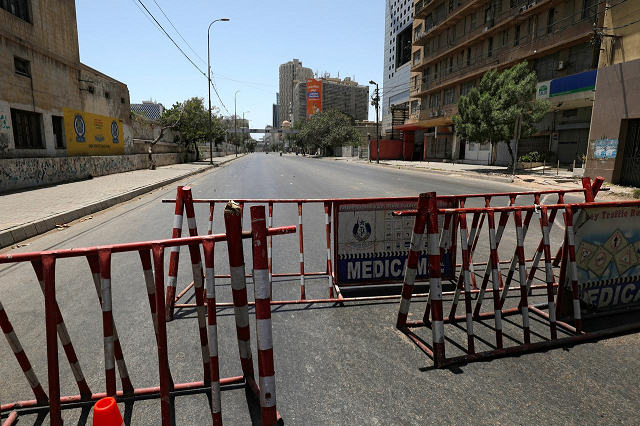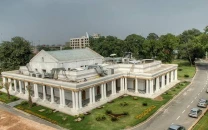Three dists declared sensitive for Covid-19
Lockdown imposed in 884 localities of Punjab

The Punjab government has declared the Lahore, Rawalpindi and Multan districts as sensitive to the second wave of the novel coronavirus pandemic.
A significant increase in the number of Covid-19 patients has been observed in the three districts.
Under initial steps taken by the government to prevent the spread of the pandemic, parks are being closed at 6pm and restaurants and business centres at 10pm daily. However, some other important decisions are yet to be taken by the provincial government in accordance with the recent instructions of the National Command and Operation Centre (NCOC).
A meeting of the Punjab Cabinet Committee on Coronavirus, headed by Chief Minister Sardar Usman Buzdar, will be held to take key decisions, including a ban on marriage halls, restricting the number of employees attending government offices to 50% of the total and making the wearing of masks and maintain social distance mandatory.
Sources said that in view of the increasing number of coronavirus cases amid the second wave of the pandemic, the provincial Primary and Secondary Healthcare Department has directed all government hospitals to use 50% of their resources for treating patients of the disease.
The top officials of the hospitals in all districts have been directed to focus on coronavirus patients. Special centres will also be set up for eh purpose.
The experience of coping with the first wave of the pandemic has helped the authorities formulate the policies and standard operating procedures (SOPs) for the second wave without any significant problems.
Smart lockdown has been imposed in 884 localities in the 36 districts of Punjab, including Lahore and at least 3,832 people have been quarantined. The highest number of placed under lockdown is 398 in Lahore, where 1,266 people have been quarantined.
Lockdowns have been imposed at 86 places in Bahawalpur, 47 in Rawalpindi, 38 in Multan, 34 in Faisalabad, 29 in Gujrat, 24 in Sargodha, 19 in Bhakkar, 17 in Dera Ghazi Khan, 16 in Sahiwal, 15 in Rahim Yar Khan, 10 each in Nankana, Sheikhupura and Bahawalnagar, seven in Chiniot and two in Chakwal district.
The Punjab government has imposed a 14-day lockdown in the areas. Houses and streets have been sealed by the police and district administration.
According to a spokesperson for the Primary and Secondary Healthcare Department, the total number of coronavirus cases in the province has risen to 106,577 and the death toll to 2,407. The number of tests conducted for the disease is over 1.67 million. The number of people who have recovered from the virus has risen to 97,614.
The spokesperson said the government was working on an emergency basis before the second wave came and a warning in this regard had been issued earlier. The Punjab chief minister is reviewing the whole situation and a number of steps have already been taken. A meeting of the cabinet committee on coronavirus will be held soon. The government has already devised the SOPs and more recommendations will be presented to protect the people from coronavirus.
Steps are also being taken continuously to create awareness about precautionary measures against the disease, the spokesperson added. Smart lockdown has been imposed on the basis of monitoring, while all government hospitals have been informed about the latest situation.
He said about 13,000 diagnostic tests for coronavirus are being conducted by government facilities in Punjab daily and the number rose to over 18,000 if the tests carried out in private sector were included. He said maximum facilities were being provided to the patients in the hospitals.
On Sunday, the coronavirus pandemic claimed eight more lives in the province whereas 369 new virus cases were reported.
Published in The Express Tribune, November 9th, 2020.


















COMMENTS
Comments are moderated and generally will be posted if they are on-topic and not abusive.
For more information, please see our Comments FAQ